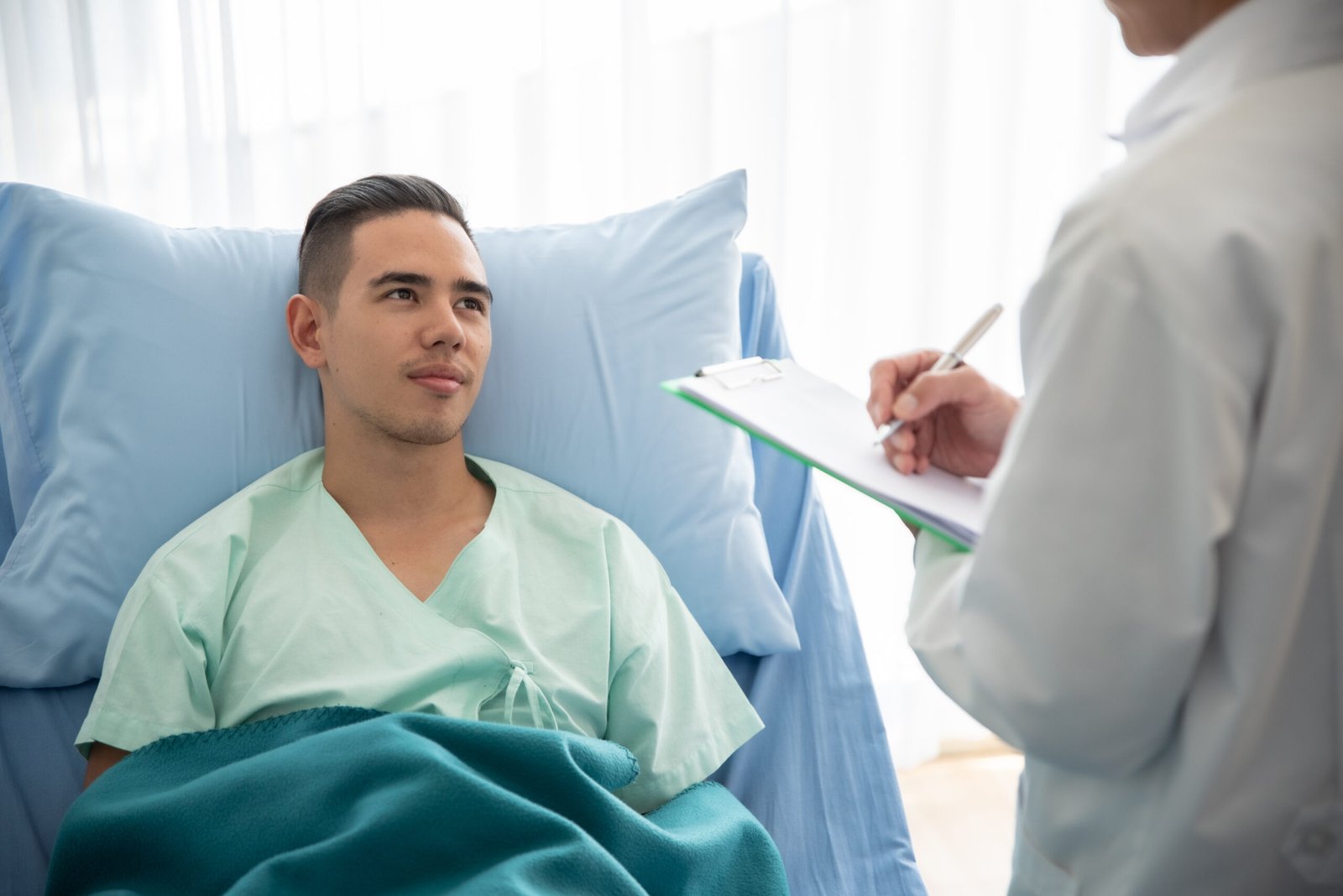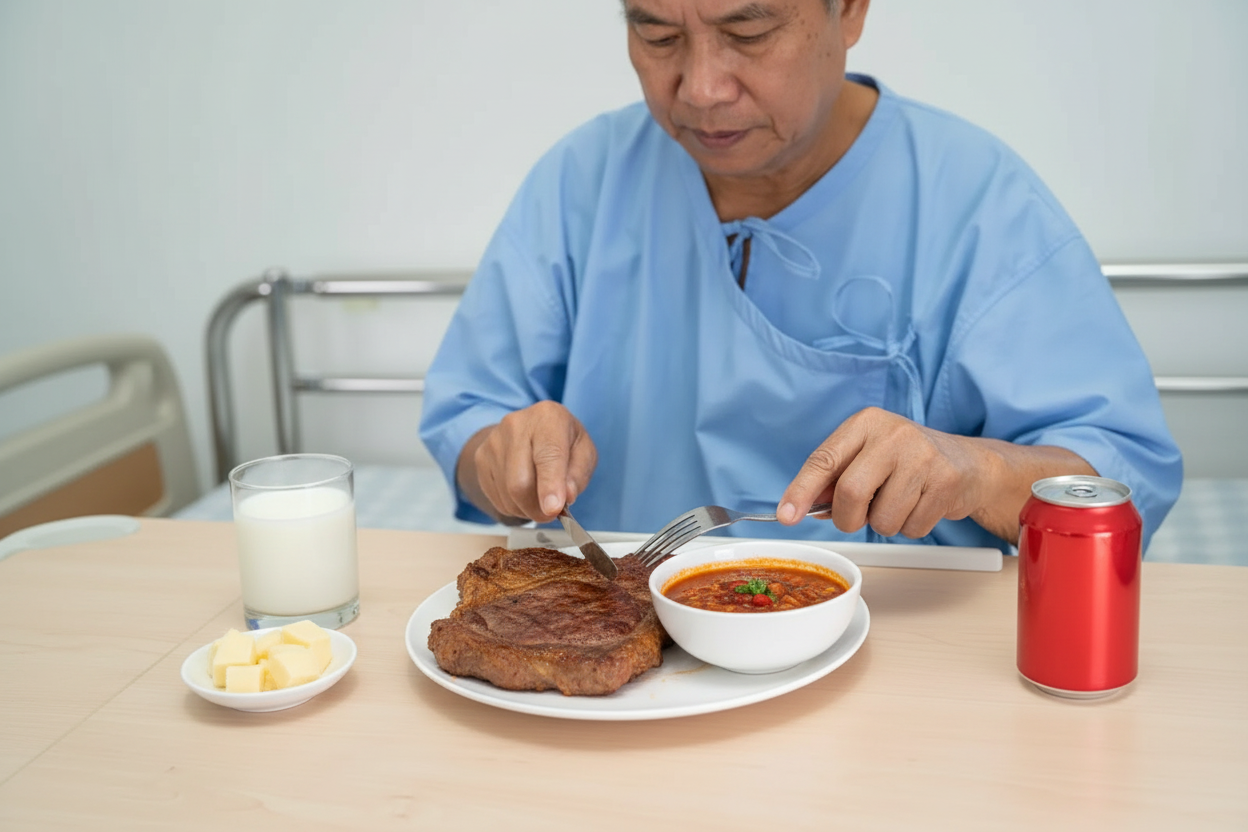Hormone therapy and radiotherapy are highly effective treatments for prostate cancer, but they can cause side effects affecting mood, energy, sexual health, and daily comfort. Understanding these effects and using strategies such as exercise, counselling, and specialist support helps men manage symptoms, protect quality of life, and stay confident throughout treatment.
Both treatments are powerful and life-saving, but they also bring challenges. The main challenge is learning how to manage their side effects. This article focuses on the side effects of hormone therapy and radiotherapy in prostate cancer treatment. We will explain how these treatments affect mood, sexual health, and physical comfort – and how to cope with them through exercise, counselling, and specialist care. Let’s get started!
Understanding Your Treatments: How Hormone Therapy and Radiotherapy Work
Hormone Therapy (Androgen Deprivation Therapy – ADT)
Prostate cancer cells usually depend on male hormones, known as androgens, to grow. Testosterone is the main androgen. Hormone therapy, also called ADT, lowers testosterone levels in the body or blocks its action on cancer cells.
- This treatment does not cure prostate cancer by itself, but it slows the disease and often makes other treatments, such as radiotherapy, more effective.
- ADT is usually given as injections, implants, or tablets.
- Because it affects the whole body, it can cause a variety of side effects, which we will explore below.
Radiotherapy (Radiation Therapy)
Radiotherapy uses high-energy rays to damage the DNA of cancer cells so they can no longer grow. It targets the prostate gland and sometimes nearby lymph nodes.
Two common types:
- External Beam Radiotherapy (EBRT): A machine directs radiation beams from outside the body over daily sessions.
- Brachytherapy: Tiny radioactive seeds are placed directly inside the prostate.
Radiotherapy can cure prostate cancer in many men, especially if it is caught early. However, it also causes specific side effects, particularly in the urinary, bowel, and sexual areas.
Common Side Effects of Hormone Therapy for Prostate Cancer
The side effects of hormone therapy for prostate cancer mainly occur as the body adjusts to lower testosterone levels. Testosterone plays a key role in mood, sexual health, and physical energy.
1. Mood Changes
Lower testosterone can affect the brain and emotions. Many men notice:
- Irritability or sudden mood swings.
- Depression or low mood.
- Difficulty concentrating or “brain fog.”
Coping strategies:
- Exercise: Regular movement, even daily walks, improves mood and reduces stress.
- Counselling: Speaking with a professional can help process emotions.
- Support groups: Sharing experiences with other men on hormone therapy can reduce isolation.
2. Erectile Dysfunction (ED)
One of the most common side effects of hormone therapy for prostate cancer is erectile dysfunction. Lower testosterone leads to:
- Reduced sexual desire (libido).
- Difficulty getting or keeping an erection.
- Decreased semen volume.
Coping strategies:
- Sexual clinics: Specialists can provide treatment such as medication (Viagra, Cialis), vacuum devices, or injections.
- Partner communication: Talking openly about intimacy can reduce stress and improve closeness.
- Counselling: Sexual health therapists can help men and couples adjust.
3. Hot Flashes
Another frequent hormone therapy side effect is hot flashes – sudden feelings of heat, sweating, and sometimes night sweats. These can disrupt sleep and daily life.
Coping strategies:
- Dress in layers and keep your environment cool.
- Avoid triggers such as spicy foods, alcohol, and caffeine.
- Some men benefit from medications prescribed by their doctor.
Common Side Effects of Radiotherapy for Prostate Cancer
While hormone therapy affects the whole body, the side effects of radiotherapy for prostate cancer are mostly limited to the pelvic area.
1. Fatigue
Radiotherapy often causes tiredness that builds up over the weeks of treatment. This is one of the most common prostate radiotherapy side effects.
How to cope:
- Gentle daily activity can help, even when you feel tired.
- Prioritise rest and maintain good sleep routines.
- Stay hydrated and eat a balanced diet.
2. Urinary Changes
Because radiotherapy affects the prostate and bladder area, many men notice:
- Frequent urination, especially at night.
- Burning sensation while urinating.
- Difficulty emptying the bladder completely.
How to cope:
- Drink plenty of water to dilute urine.
- Avoid caffeine and alcohol, which irritate the bladder.
- Medications may be prescribed if symptoms are severe.
3. Bowel Changes
The rectum sits just behind the prostate, and radiation can irritate it. This can lead to:
- Diarrhoea or loose stools.
- Urgency – needing to rush to the toilet.
- Mild rectal bleeding in some cases.
How to cope:
- Eat a bland, low-fibre diet during treatment if diarrhoea appears.
- Stay well hydrated.
- Ask your doctor about anti-diarrhoeal medication if needed.
4. Sexual Health Changes
Just as hormone therapy lowers desire, radiotherapy can affect the physical ability to achieve an erection. Damage to nerves and blood vessels may cause erectile dysfunction months after treatment.
How to cope:
- Sexual clinics offer medications and devices to help with erections.
- Counselling and therapy can support intimacy concerns.
- Combining medical and emotional support often works best.
Navigating Combined Hormone and Radiotherapy Treatment Side Effects for Prostate Cancer
Many men receive hormone therapy and radiotherapy for prostate cancer at the same time. This combination is effective because hormone therapy (ADT) lowers testosterone, shrinking the prostate and making cancer cells more sensitive to radiation. But when used together, their side effects can overlap.
How It Affects Patients
- Mood: Lower testosterone and the stress of daily treatment can lead to irritability, sadness, or lack of motivation.
- Erectile Dysfunction: Hormone therapy reduces sexual desire, while radiotherapy can damage nerves and blood vessels, affecting erections.
- Hot Flashes: ADT often causes sudden heat and sweating, which can be worsened by fatigue from radiotherapy.
Coping Strategies
Managing side effects requires a proactive approach. Rather than waiting for problems to build up, men who take small, steady steps often cope better and recover faster.
- Exercise helps reduce fatigue, protect muscle mass, and boost mood. Even light activity, such as walking, stretching, or yoga, can make a noticeable difference. Resistance training is particularly helpful to counteract muscle loss caused by hormone therapy. Staying active also supports bone health, which can be at risk with long-term treatment.
- Counselling supports emotional well-being and helps with changes in identity or intimacy. Adjusting to shifts in mood, energy, or sexual function can feel overwhelming, and talking to a professional or joining a support group provides a safe space to process these changes. Partners may also benefit from counselling, as prostate cancer treatment affects relationships as well as the individual.
- Sexual clinics provide tailored solutions for erectile dysfunction, from medications to therapy. Specialist clinics can offer advanced treatments such as penile rehabilitation, vacuum devices, or hormone-support strategies. Addressing sexual health early prevents long-term complications and helps men maintain confidence and intimacy.
In addition, building a strong relationship with your healthcare team is essential. Regular check-ups, open communication, and honest reporting of symptoms ensure that side effects are managed quickly and effectively. Together, these strategies help men maintain quality of life during and after treatment.
Taking the Next Step in Your Care
Managing the side effects of hormone therapy for prostate cancer and radiotherapy for prostate cancer can feel overwhelming at first, but the right support makes all the difference. By staying active, seeking counselling when needed, and making use of sexual health clinics, men can maintain both quality of life and long-term health during treatment.
If you are considering hormone therapy for prostate cancer, learning about the treatment and its side effects can help you prepare and feel more confident in your choices. For those starting external beam radiotherapy, understanding what to expect allows you to plan ahead and manage any changes early.
Most importantly, you do not need to face this journey alone. Our team is here to guide you at every step. Book a consultation today with Dr Carla Perna to discuss your treatment options, ask questions, and receive personalised advice. Together, we can design a care plan that supports both your recovery and your overall well-being.
FAQs
What are the side effects of radiation and hormone treatment for prostate cancer?
The most common side effects include fatigue, hot flushes, mood changes, erectile dysfunction, urinary frequency, and bowel changes. These effects happen because hormone therapy lowers testosterone and radiotherapy affects the pelvic area. Most side effects can be managed with lifestyle changes, medicines, or specialist support.
How long do side effects last after hormone therapy?
Some side effects, such as hot flushes or mood changes, improve within months after stopping treatment. Others, like reduced sexual function or bone thinning, may last longer depending on how long hormone therapy was given. Regular follow-up helps manage and monitor recovery.
What is the success rate of radiation and hormone therapy for prostate cancer?
For men with localised prostate cancer, combining radiotherapy with hormone therapy can achieve very high success rates, often comparable to surgery. Studies show this approach lowers the risk of recurrence and improves long-term survival. Outcomes are best when treatment is started early.
Can you combine radiation and hormone therapy for prostate cancer?
Yes, this is a standard approach for many men. Hormone therapy (ADT) shrinks the prostate and makes cancer cells more sensitive to radiation. Together, they increase the chance of a cure while keeping the treatment non-invasive.
How long can a man stay on hormone therapy for prostate cancer?
The duration depends on the stage of cancer and overall health. Some men need hormone therapy for only a few months, while others may continue for several years. Your doctor will tailor the length of treatment to your specific case.
Does hormone therapy for prostate cancer affect mood?
Yes, lower testosterone can cause mood swings, irritability, or low energy. Support from counselling, exercise, and open communication with loved ones can help. If symptoms become severe, it is important to tell your care team.
Can hormone therapy cause erectile dysfunction?
Erectile dysfunction is a common side effect of hormone therapy because testosterone levels are reduced. Many men notice lower libido and difficulty achieving erections. Sexual health clinics and medicines can help restore confidence and intimacy.
Why do men get hot flushes during hormone therapy?
Hot flushes happen because hormone therapy lowers testosterone, which normally helps regulate body temperature. This can lead to sudden heat, sweating, and sometimes night sweats. They often improve over time or with simple lifestyle adjustments.
How can I cope with the side effects of hormone therapy for prostate cancer?
Regular exercise, a healthy diet, and counselling are some of the best strategies. Men can also benefit from sexual health clinics or support groups. For personalised guidance, it’s recommended to book a consultation with Dr Carla Perna, who provides expert care for prostate cancer patients in the UK.
What are the most common side effects of radiotherapy for prostate cancer?
The main side effects are urinary changes, bowel irritation, fatigue, and sometimes sexual dysfunction. These happen because radiation can affect nearby organs like the bladder and rectum. Most effects are temporary and can be managed with supportive care.
Does radiotherapy for prostate cancer cause fatigue?
Yes, fatigue is one of the most common prostate radiotherapy side effects. It usually builds up over the weeks of treatment and improves a few weeks after therapy ends. Gentle daily activity and good sleep routines can help.
What urinary problems can happen after radiotherapy?
Men may notice more frequent urination, a burning sensation, or difficulty emptying the bladder. These usually settle with time and medicines if needed. Drinking plenty of water and avoiding caffeine or alcohol can reduce irritation.
Can bowel habits change after prostate cancer radiotherapy?
Yes, radiotherapy can sometimes cause diarrhoea, urgency, or mild rectal bleeding. These effects are usually temporary, but dietary adjustments and prescribed medicines can help. Long-term changes are less common with modern MRI-guided radiotherapy.
Does radiotherapy for prostate cancer affect sexual function?
It can, especially months after treatment, when nerves and blood vessels around the prostate are affected. Some men develop erectile dysfunction over time. For advanced support, patients can speak with Dr Carla Perna, a prostate cancer specialist based in the UK, who helps men manage both treatment and quality of life.
References:
- National Cancer Institute. (2025). Hormone Therapy for Prostate Cancer. https://www.cancer.gov
- Cancer Research UK. (2025). Radiotherapy for Prostate Cancer. https://www.cancerresearchuk.org
- American Cancer Society. (2025). Prostate Cancer Treatment and Side Effects. https://www.cancer.org
- NHS. (2025). Prostate Cancer: Treatments and Side Effects. https://www.nhs.uk




